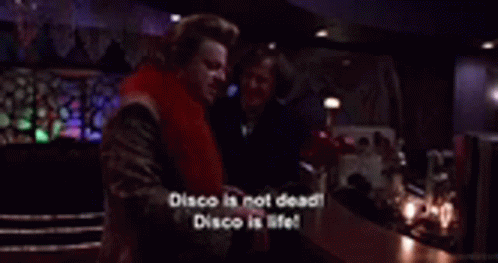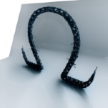I heard some people say theyre the same thing, but others are adamant that they have different meanings. Which is it?
Disq
Disque*
Disque?
Way too cumbersome
Disqueue, then.
Dischqueue
Disk but with a soft k, like in kif
Disc is short for discus.
Disk is short for diskette, the square things some discs are kept in.
Isn’t a diskette just a small version of a disk? Much like kitchenette to kitchen
I don’t think so https://en.m.wikipedia.org/wiki/Floppy_disk
To quote from your source:
8-inch floppy disk, inserted in drive, (3½-inch floppy diskette, in front, shown for scale)
Thats how I interpret it as well.
Get outta here with your actual helpful answer
I’ve been known to use them interchangeably.
It’s British English (disc) vs American English (disk).
Has nothing to do with country. Discs are round objects. In the computing sense that’s cds, dvds, etc.
Disks are floppy disks(diskette, “discette” never existed as a word) , hard drive disks… etc. There is a difference and it has nothing to do with what land you’re in. Disk in usa never meant a circular object like a Frisbee (discus for example)
But the floppy diskette and the “hard disks” did in fact have circular discs inside that spin around.
I suspect that the word diskette was created as an analog to tape “cassette”. With both diskette and cassette, the media is stored inside an enclosure, and you don’t have to take it out manually.
“-Ette” is a common diminutive used to imply that something is a smaller version of something else. Like many things, we nicked it from the French.
Cigarette, a little cigar. Featurette, a short feature. Novelette, a miniature novel. Etc.
So, diskette, a little disk. Quite separate from the ones spinning in your company’s mainframe at the time. Those ones were two feet in diameter locked in a steel cabinet that weighs two tons. This one can fit in your shirt pocket. You get the idea.
Considering “cassette” is the diminutive form of “casse” which meant “case,” this seems right. This meant that the magnetic tape was held in a “diminutive case” which was arguably true when compared to records and 8-tracks.
So, diskettes also being magnetic, also being encased in something, and also being the diminutive form of a larger thing tracks.
By george, I think they’ve got it.
This feels like it makes sense.
I think they got that from Wikipedia
Jerboa won’t let me post a screenshot right now but here’s a link
The fact that there’s even a document on Apple.com is mind blowing
That’s crazy. I like their interpretation though. A disc is ejectable but a disk isn’t.
i assure you that floppy disks are ejectable.
It’s from diskette. Not about what country the spelling is from.
Prepare to have your mind blown.
Portable Hard Disc Drive https://pro.sony/en_GB/products/portable-storage/psz-hb-b-series
I don’t doubt the diskette comment since it’s an American invention. But sometimes this nuance shows up.
A disk drive reading disc’s would be a disc disk drive
disc disk
Got ‘em!
And if it reads 70s music records, it could be a disc disk disco drive!
Its a disk when its magnetic, disc when optical.
The way to remember it is that its disk because its magnetik.
No a disc is round
What if it’s optikal?
I cannot stress enough how efficiently you ruined my ability to use the memory trick.
Just remember the c in disc is shaped like a magnet.
Now you’ve gone and made things worse.
Is a plate optical or magnetic?
Depends on how you store data on it. If you write with a pen its optical.
I usually store food on them
Including fridge magnets?
Where do magento-optical fit?
disck
Disque
Is a VHS tape a disk then?
No, that’s a tape. It has to be dis(c/k) shaped to be a disk.
the tape spooled up on the reel inside a VHS looks like a thi(c/k) dis(c/k)
thic(k/c)
Linear disk 🤓
more disk shaped than flash memory.
Disque
Diskette
Petit Disk
Same word. Different dialects.
I am not sure, but my oldest child was looking at an English brochure for a trip to France and a asked me "what the heck is a dis-coth-a-cue? Discotheque. A Disco, a dance club. And yes disco-tek is spelled Discotheque in English.
Not in America it ain’t. Here it’s spelled “Disco is dead.”
Cool…

Disc and disk are varient spellings of the same word that pre-exist computing. Disc is more common in British English, Disk more common in American English. But yeah since computing came along disk has also been used more for magnetic media (hard disk) while disc has been used more for optical media (compact disc). I wouldn’t be surprised if this only happened because of how the CD was marketed and branded as a “compact disc” as a trademark while hard disks and floppy disks etc were more generic terms.
In modern parlance, this has been my working understanding too:
But yeah since computing came along disk has also been used more for magnetic media (hard disk) while disc has been used more for optical media (compact disc).
Optical:
- compact disc
- laser disc
Magnetic:
- 3.5" diskette
- 800GB ard disk drive
…and just to point out there is some disagreement
Magneto-Optical , such as Sony MiniDisc, is sometimes referred to Disc for its optical properties and sometimes as a MO Disk for its magnetic properties.
It’s the same thing. The difference is origin. Disk is American. Disc is British. Usually the only time “disc” is used in the US, is to refer to something round. A CD could go either way, depending on the writer.
Disck
A disk is something that contains information. It stands for Dense Inside Stored Knowledge
Dense Information Storage Circle
https://en.wiktionary.org/wiki/disk
In most varieties of English, disk is the preferred spelling for magnetic media (hence floppy disk, hard disk, disk drive), whereas disc is preferred for optical media (hence compact disc, digital versatile disc, optical disc). For all other uses, disk is preferred in American English and acceptable in Canadian English, and disc otherwise.
Less commonly, disc is used for magnetic media (as in floppy disc and discette; similarly, disk is sometimes used for optical media, as in compact disk and optical disk.
The reason for this is actually pretty interesting though. Historically it was just a US/UK English difference, but it evolved into both being used because one of the first big manufacturers of optical discs, Philips, called them discs, while the US-based IBM spelled their magnetic disks with a K.
It’s all disk? 🌎👨🚀
Always has been 🌎👨🚀🔫👨🚀











